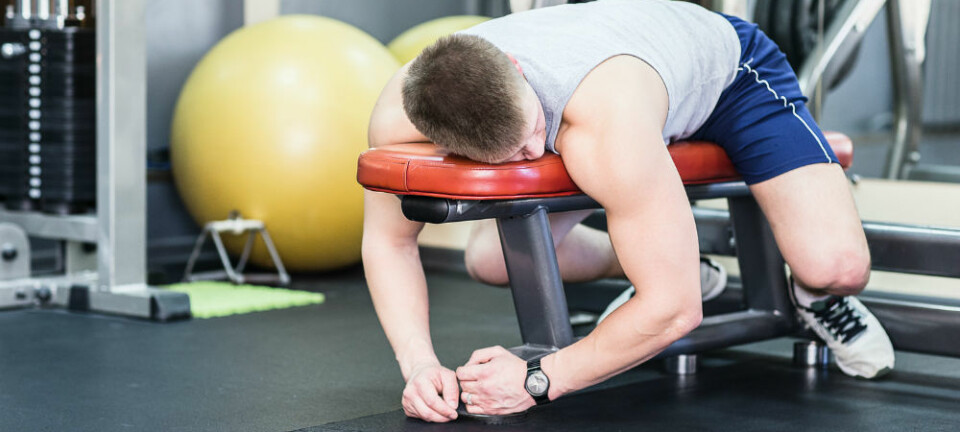
Hard exercise and sleep deprivation could be bad news for the heart
Young men trained intensively with and without curtailed sleep. A new study shows that with too little sleep, they secreted more of a substance that is a biomarker for potential future heart disease. But the study has major weaknesses, says researcher Stein Ørn.
Lack of sleep increases the risk of several cardiovascular diseases, such as high blood pressure and heart attacks. It also causes chronic disturbances in a person’s sleep pattern.
These risks are known from previous population studies.
At the same time, exercise can reduce the risk of cardiovascular disease.
So what can you do if you sleep poorly, with or without exercise?
Swedish researchers wanted to find out how a lack of sleep affects the way the cardiovascular system is loaded during hard training.
They collaborated with researchers at Akershus University Hospital (Ahus).

Acute heart trouble triggers protein increase
Heart muscle cells contain a special protein called troponin, which is secreted when you train at high intensity.
Troponin is routinely measured in hospitals because it increases significantly when a patient experiences acute heart problems.
High levels of this protein after exercise have been linked to an elevated future risk of illnesses affecting the cardiovascular system.
“That’s why we thought it was important to study whether less sleep impacts troponin secretion during exercise,” Jonathan Cedernaes told expertsvar.se.
Cedernaes is a doctor and lecturer in medical cell biology at Uppsala University.
He points out that many occupation groups – like employees in the health care system – regularly experience too little sleep and interrupted sleep.
Young, healthy men tested in sleep labs
The study involved 16 healthy, normal-weight young men who had not had cardiovascular or related diseases in their family.
All of them had normal sleeping habits and regularly got between seven and nine hours of sleep.
The study subjects were placed in a sleep lab where they were allowed to sleep undisturbed for three nights in a row. In the second sleep round, they were kept awake for half the night for three nights in a row.
Both times they trained intensively the day after the third night.
The researchers took blood samples from each of the participants before and after the training sessions. Troponin levels increased in the hours after exercise both times.
However, the level of troponin rose more and was 40 percent higher after three nights with curtailed sleep than after the nights with normal sleep. The results showed individual differences.
This finding suggests that sleep deprivation can increase exercise-induced heart disease, say the researchers.
The study has been published in the journal Molecular Metabolism.
Valuable knowledge for athletes and the military
High-intensity training generally has long-term benefits.
“Our results may be worth looking at for certain groups, such as high-performing athletes and the military,” Cedernaes stated in a press release from Uppsala University.
The researchers believe it’s possible that chronic sleep problems may increase the risk of the heart being damaged by more intensive exercise.
They point out that the study is small and consider it a pilot study. Their hope is for follow-up studies with more participants, including female participants and other age groups.
Not necessarily a harm marker
The connection between troponin and stress is strong, according to Stein Ørn. He is a specialist in internal medicine and heart disease and chief physician at the Department of Cardiology at Stavanger University Hospital.
He is also an adjunct professor at the University of Stavanger and in recent years has published many studies on exercise load and troponin.
“Troponin is an extremely important marker for possible future heart disease, but also purely a stress marker, which does not necessarily warn of potential injury, Ørn says.
He explains that troponin is formed in the heart muscle itself and is either a sign of stress or heart damage.
Troponin levels can thus very easily be misinterpreted, he believes.
“It may be that curtailed sleep has increased the stress in this study, but there are major weaknesses in the way they did the experiments,” he says.
Weakness of the method
Ørn believes that far too much information is missing about how intense the imposed cardiovascular stress was.
“The participants’ exercise load was calculated to achieve 75 percent of maximum oxygen uptake, but the study provides too little information about how they controlled the load,” says Ørn.
The fact that the participants cycled twice might have had an effect in that they engaged more strongly the second time.
“We know that people hold back a bit the first time they cycle through a study, and they often take part more fully when they’ve been through it before,” he says.
He believes they should have done the tests in the opposite order to avoid this source of error.
In other words, let the participants sleep less the first time, and get a normal night’s sleep the second time, or possibly repeat the experiment in reverse order.
Ørn concludes that the way the study was carried out makes knowing to what degree sleep deprivation actually influences heart load during exercise far too uncertain.
Exercise can be protective
A good and long enough night's sleep protects the heart. Chronic and recurrent sleep disorders are bad for heart health.
But many lifestyle factors affect heart health.
Previous studies suggest that exercise can counteract certain negative effects of sleep deprivation on metabolism.
Population studies also indicate that exercise may counteract the negative effects of sleep deprivation on the cardiovascular system.
People who state that they exercise regularly lower their risk of dying from cardiovascular disease, even if they get a little less sleep than they should.
But the amount of sleep we need is individual.
Reference:
Teemu Martikainen et.al.: Effects of curtailed sleep on cardiac stress biomarkers following high-intensity exercise. Molecular Metabolism, 2022.
———
Translated by Ingrid Nuse

































